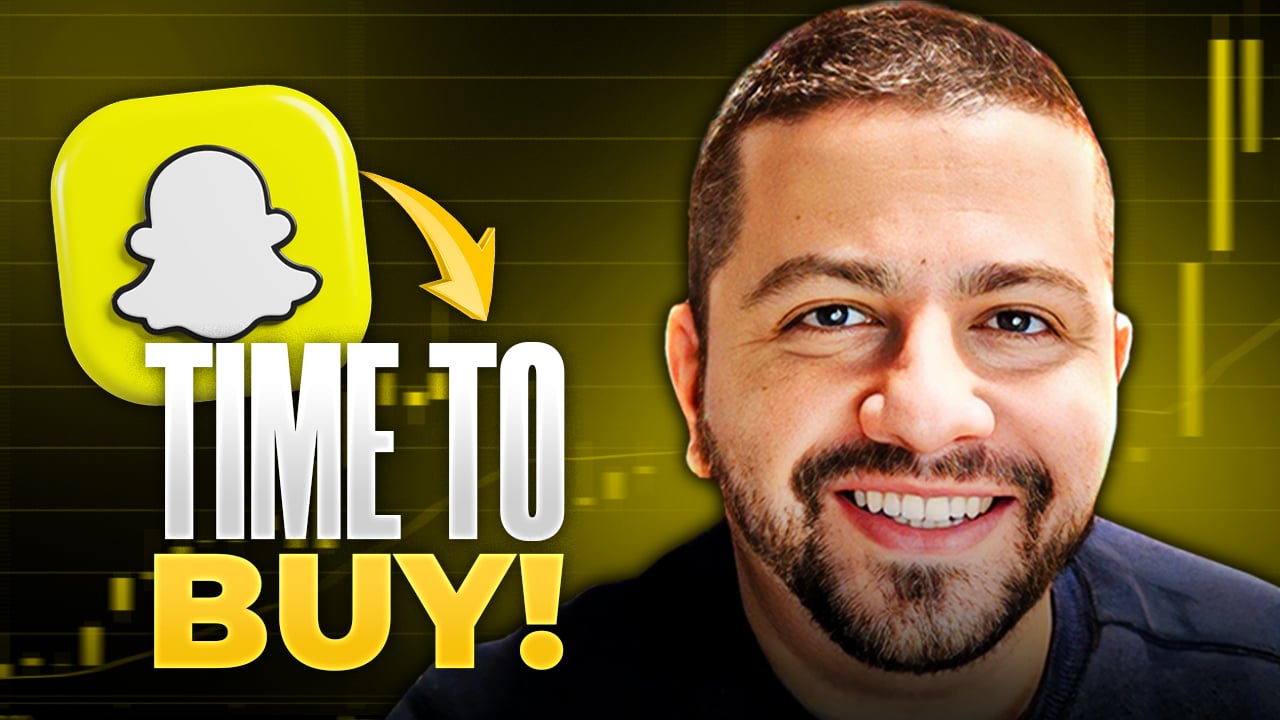In this episode of Market Foolery, Chris Hill and Motley Fool analyst Jason Moser go through the latest earnings releases of three great businesses. On the entertainment front, a streaming giant impresses with subscriber additions. A fast-casual restaurant chain shows tremendous growth in digital sales. Finally, our hosts discuss Snap's (SNAP 0.19%) growth numbers and much more.
To catch full episodes of all The Motley Fool's free podcasts, check out our podcast center. To get started investing, check out our quick-start guide to investing in stocks. A full transcript follows the video.
This video was recorded on April 22, 2020.
Chris Hill: It's Wednesday, April 22. Welcome to Market Foolery. I'm Chris Hill. With me today: Mr. Jason Moser. Good to see you.
Jason Moser: Hey, it's good to see you too, man. I'm missing the day-to-day that we normally get to enjoy at the office, so being able to connect like this, I think, it's keeping us all sane to at least a degree.
Hill: Yes, to a degree, slightly less insane. We got earnings season heating up. We're going to talk a little restaurant. We're going to talk a little social media. We're going to start that with Netflix, because Netflix added 16 million global subscribers in the first quarter and, I don't know, I wasn't surprised. I mean, I wouldn't have picked that exact number, but the fact that they added that many, that's not a surprise.
Moser: Well, I mean, to be clear, management didn't pick that number either, right? That was about double what they forecast, but they also didn't forecast the situation on the ground to be what it is today. So I mean, the sub numbers were terrific. And really, that was strength in every geographic region in which they report. It was really encouraging from that perspective. I mean, this is a bit of a tale of two earnings reports in that the user growth was tremendous, obviously; the financials, a little bit less so. And they attribute some of that to currency effects, and of course, as Netflix becomes more of a global business, currency effect will play out on the business.
But you know, we talk about this often, we view those currency effects through the long-term lens, as a net neutral. I mean, they fluctuate in the near term and it's really difficult to try to account for them over the long term. If you look past it, I mean, the best businesses in the world are global in nature, right? And so, we're not going to hold that against Netflix. I mean, that's ultimately a good thing, but it is something to at least take into consideration growing your subscribers by that much and still the financial is not necessarily reflecting that growth.
And then furthermore, obviously, with conditions on the ground the way they are, production is shut down, which made their cash flow number look a little bit better, because they're not doling out as much in the near term on content. But all of this put together, I think what you can say is that they pulled a lot of future growth forward into this quarter. And going forward, I can see a world where the numbers aren't as robust, certainly on the subscriber side, and then they're going to restart that content engine. So those cash flow numbers will normalize, then it's just kind of back to business as usual and trying to figure, OK, is this a business that at some point or another will maybe be able to get to that sustainable positive free cash flow number?
I think, yes, they will. I just think it's going to take a while to get there. But all in all, listen, they're doing the same thing they've always done, putting out a lot of content and getting a lot of people to sign up for it, and that's good.
Hill: Yeah, I think management said there are only two countries where they have not shut down production, and those countries are Korea and Iceland. And no disrespect to Korea and Iceland but ...
Moser: ... huge markets, right? [laughs]
Hill: [laughs] ... they're going to need to start that up at some point. Now, that being said, I think they've got enough original content in the pipeline to get them through 2020 and deep into 2021, and I think that's encouraging if you're a shareholder, because that's different from what we've seen out of, say, for example, the movie studios, where they're pushing their slate back later this year and into 2021 and even, in some cases, 2022. So the fact that Netflix has got that pipeline filled for the next 12 to 18 months, that's good news.
Moser: Yeah, I mean it's not like this content is not going to materialize, it will materialize. It's a little bit delayed but, you know, I think this goes back to one of the big advantages that Netflix has. And it doesn't have this library of all-compelling content. They have a library that accounts for, really, a broad cross-section of the world. They have a little bit of something for everyone. And when I say "a little bit," that really is, I mean, that's a lot of bit, right? I mean, Netflix's library is just huge.
And so even when you see content rolling off the platform, they're bringing new content on to the platform. And I think that right now particularly, it's an extremely important value proposition to communicate, it's not an expensive service for what you're getting. The value proposition, I think, is really strong.
And so, with these new subscribers that they brought in, I think this is going to be an opportunity for them to really demonstrate the staying power that the platform has. I don't know that I'd really worry about the pricing power dynamic today. I think that's really the bigger question that a lot of us have is, over time, how much will they be able to raise those prices? I mean, that's going to be particularly sensitive right now and probably over the course of the next 12 to 18 months, but they don't have to worry about that right now, because they have such a broad library of content. So they're going to be able to get through this over the course of the next year, year and a half.
And as you said, as things get back to normal, I mean, it's not like these deals went away, it's just delayed. And so they're going to continue to bring out just a ton of content. I mean, Reed Hastings knows what he's doing, and he's got a great right-hand-man there in Ted Sarandos. This really is the quintessential stay-at-home stock, I believe.
And it's not surprising to see the market reacting to the stock the way it is today, again, because the financials don't really follow the subscriber adds, so to speak. But I think, you know, this is the same business that we've been talking about all along, and they take that long-term focus to the business as well, so I think they're going to be fine.
Hill: Yeah, you look at Netflix stock, as you said, not doing much as opposed to shares of Chipotle (CMG +0.65%), which are up somewhere in the neighborhood of 10%, because Chipotle's same-store sales in the first quarter were up 3.3%. Now, you think back to February and the numbers they were putting up there, that's obviously carrying the weight here, but the fact that they had positive comps at all in this environment is amazing. And I guess we shouldn't be surprised that digital sales are really leading the way here.
Moser: Yeah, I mean, if you look at the way the business performed over the quarter, through the end of February, comps were actually up 14.4%, and that was with 10.7% transaction growth. Now, comp sales during March, I mean, that's really what dragged the performance down for the quarter. Comp sales in March, of course, were negative 16%, and that makes sense, right? I mean, everybody is kind of dealing with the same situation here.
But you know, when you look at Chipotle and what CEO Brian Niccol has done to this business since he took over, I really am not surprised to see the stock performing the way it is today for a number of reasons, but this is, I mean, I think they're really set up to succeed in this environment thanks to its casual nature and the early investments that they've made in technology.
And as a consumer, I mean, we've used Chipotle here and there to feed our family over the last several weeks. And as a consumer, it's just a breeze. I mean, you order on the app, you drive in, and you pick it right up, or you can have it delivered -- they now have this delivery relationship with Uber Eats which is certainly helping. So this is kind of like a Domino's Pizza in the sense that they're really doing an excellent job of leveraging that physical-store footprint to maximize sales.
And then you have to assume that when things get back to normal, they'll still have all of that skill set along with this large footprint of stores that's going to be able to handle that dine-in traffic as well. So this is certainly one of the restaurant companies that's set up in a really good spot, in a market where most restaurants are really feeling a lot of pain.
Hill: Yeah, it's going to be interesting to see with this fast-casual space, I'm thinking Chipotle, Panera, and others, what the layout of the restaurants looks like once they get to the point where they start building new restaurants. Because it's not hard for me to imagine Chipotle leading the way in the sense that they say, "You know what, dine-in is not as important to us as the throughput is, and so we're going to start constructing bigger kitchens, but smaller capacity for dine-in."
Moser: Yeah, I think that's a reasonable assumption. I mean, when you look at the business today, they have around 2,600 restaurants, they only have about 100 of those that are temporarily closed. And those are restaurants that are in, like, malls or shopping centers. But for the most part, the restaurants are open.
And you're right, the digital sales number, I mean, the digital sales for the quarter grew 80% and accounted for 26.3% of sales for the quarter. But if you look at March, those digital sales grew almost 103% and actually accounted for better than 37% of the sales. And so you could certainly see that as conditions on the ground got more difficult, their performance actually improved on that digital side; that makes a lot of sense. And when you couple that with the fact that they now have 11.5 million enrolled rewards members. I mean, that rewards program that they've rolled out has really, really been a nice catalyst for the business, and it's giving them not only a lot of data to work with, it's actually bringing a lot of new customers into the stores.
And so, we were talking about that years back when they were dealing with that health crisis, right? The food health scare. It was not only trying to get those loyal customers, like us, back in the stores, but how are they going to convince new customers to come try it? And I think they've done a very good job with that rewards program in enticing new customers to come try it.
And I think another catalyst behind the way the market is reacting to the stock today is, a lot of restaurants right now are facing a liquidity crisis, right? The cash that they need to fund employees to keep stores open and whatnot, I mean, Chipotle is in a position right now, they don't have to worry about that, like, at all. I mean, their balance sheet is in really great shape. Their ongoing cash burn number is very minimal when you put in the context of the digital and the delivery business that they're doing. And so they've got a year, a year and a half where there's not going to be a liquidity question for this business at all. And you have to assume in a year, a year and a half, we're going to be at least back to some semblance of normal.
And so, it kind of goes back to that old saying, you know, when crises like these occur, investors look to the strongest companies in the space, because they're the ones that typically come out stronger. The signs are all pointing toward Chipotle coming out of this a lot stronger after everything is said and done. And if you are a shareholder, you got to feel really good about that.
Hill: The stock of the day. It could be Chipotle, but it's not, it's Snap, because Snap's first-quarter report -- put aside the fact that Snap was not profitable in the first quarter -- this quarter was pretty much everything you would want if you're a shareholder. Daily active users were up, revenue per user was up, overall revenue was 44% higher than a year ago.
And Jason, we've been talking about, well, what are the businesses that benefit from everyone staying at home. You talk about Netflix being the quintessential stock. I didn't have Snap on that list. I didn't think of Snap as being a business that would benefit from this environment, and clearly it is.
Moser: Yeah, it is. And I'd tell you, given the state of things, I thought this was a really encouraging quarter. And remember, last quarter we were talking about that report, and to me, it seemed like a really encouraging quarter last go around, and the market punished the stock, right? I mean, it was up toward $19 a share and shares tanked on what really looked like a pretty good earnings report. This, I think, is another good earnings report. So the strong two consecutive positive reports together. I mean, maybe this is the beginning of a trend for them.
And when you look at, you know, this falloff in ad spending, and no business is immune to it and certainly Snap is not immune to it either. But it's interesting, because on the one hand, Snap is not as big of a platform as something like Facebook or Instagram, but with that, while they don't have that same reach, they also don't have quite the same customer demographic, right? They're not relying on all of these small businesses that are having such a tough time right now. And they rely, I think, typically on these bigger businesses, these big-brand ad campaigns. I mean, they do have small businesses on their platform, but it's not something like Facebook or Instagram would rely on. So they're a little bit more immune to some of that dropoff in some of these other social platforms.
And it seems like they've done a good job on the content side in becoming a source of information for people dealing with the COVID-19 crisis. Their user base is looking to Snapchat as a source of information; not only entertainment, but information. And I think that's really important. And so I think we're going to see, with all of these social media companies, Facebook and Twitter, Snap, they're going to see strong user numbers. I think engagement is going to be up all across the board because they're just sources of information.
I think we're going to see a disparity there. Like we saw with Netflix, you're going to see a disparity. Maybe the ad revenue is not necessarily lining up with the growth in users, but really that's OK; that will come back in time. So then it's just a matter -- for me, with Snap, the two questions I have for this business longer term are, will users continue to age out of this platform? Because it does seem like, beyond 35 years old, they're having a really hard time getting folks like us to use the platform. It's not really a platform for us older folks.
And then, also, the other question is, the next generation of prospective users, are they going to be going onto Snapchat, or is there going to be some type of a competitor out there that's taking traffic away? Something like TikTok or something like that.
This report doesn't make me want to own Snap stock. I think it's a wonderful report, and I think the market is reacting appropriately. They still have a lot of challenges. I mean, they need to get that stock-based compensation number down; it's still 38% of revenue. But it was definitely a positive quarter, they brought on Peter Naylor, who's a former ad exec with Hulu, to help build out their ad business. And so I think they're making some good moves.
Not out of the woods yet, still not profitable, need to work on that cash flow number, need to get that stock-based compensation down. But, again, I think this was the second consecutive positive report for them. And so that certainly is encouraging.
Hill: Well, and the stock up 30% today. Yes, it's trading just north of $16 a share, so still down from its high, but over the past year, it's up in the neighborhood of 40%. I'm, sort of, like you, I have the same questions about Snap. How will they be able to bring in the next generation? It's not to say they can't do it, but I just look at it and think more along the lines of like, "Oh, maybe I should have picked up a couple of shares, you know, a year and a half ago when it got knocked down." Because for a long time, I don't think either one of us has been extremely bullish on Snap as a business. But you go back to the end of 2018 and it was like, it was below $5 a share. And I remember, you and I were like, but that seems low, like, even for Snap, that seems low.
Moser: Yeah, I mean, it is low when you consider, you know, any type of a platform that's generating hundreds of millions of users on a daily basis. I mean, there is somewhat of a competitive advantage there in the size of your user base, but like fashion, I mean, you do see these social platforms, particularly the niche ones, they could be a little fleeting. And it does depend, at least in part, on innovating, it becoming something more. Like, I think for Snap, the business to really take it to the next level, they've got to become something more than just Snapchat, right?
And you know they're trying things, like, with Spectacles and what not. Listen, I run the Augmented Reality service here at The Fool, so I mean, I really want to like Snapchat or Snap. There's an interest there, when you read through a call and you hear the mentions of augmented reality and immersive technology and how that's affecting the ad market and how Snap is making investments in that space. I think they're skating to where the puck is going, in that regard.
But they do have to become something more, and I just don't know what that's going to be. And so in the context of other opportunities out there, again, this isn't the type of quarter that makes me want to own Snap shares anymore. I just feel like there are better businesses out there, but by the same token, it does seem like they perhaps have turned a corner here and are starting to figure some things out.
Hill: Jason Moser, thanks for being here, man.
Moser: Thank you.
Hill: As always, people on the program may have interests in the stocks they talk about, and The Motley Fool may have formal recommendations for or against, so don't buy or sell stocks based solely on what you hear.
That's going to do it for this edition of Market Foolery. The show is mixed by Dan Boyd. I'm Chris Hill. Thanks for listening. We'll see you tomorrow.





